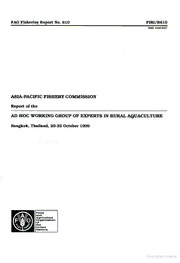
Report of the Ad Hoc Working Group of Experts in Rural Aquaculture : Bangkok, Thailand, 20-22 October 1999 PDF
Preview Report of the Ad Hoc Working Group of Experts in Rural Aquaculture : Bangkok, Thailand, 20-22 October 1999
FAOFisheriesReportNo.610 FIRI/R610 ISSN0429-9337 ASIA-PACIFICFISHERYCOMMISSION Reportofthe ADHOCWORKINGGROUPOFEXPERTSINRURALAQUACULTURE Bangkok,Thailand,20-22October1999 Copyrightedmaterial FAOFisheriesReportNo.610 FIRI/R610 ASIA-PACIFICFISHERYCOMMISSION Reportofthe ADHOCWORKINGGROUPOFEXPERTSINRURALAQUACULTURE Bangkok,Thailand,20-22October1999 FOODANDAGRICULTUREORGANIZATIONOFTHEUNITEDNATIONS Rome,1999 Thle On» TtpNaohruarhebtebeliaopdouioacennrrasdsttoiaifcgroooiinnftneasdctstaoeh.iurtenohonnoFtisroniiegmtomipdteplhslya,eotnolyhdreeegcdeaAoxlgnaprscnritedcearusttnlsuhitiseunorognpefrtoaehfOsenraeygdnnaeyctlnoaoiiutmpzniiiattontraniiytooo,intontnwmehoaorffrtaietittrtsoshiroeayfe,lrvUociennintirtitytehoeorindrss M-40 ISBN92-5-104396-5 0ArcArAlaegep0lltrpp1,rirlri0pcoiieuh0dcgvluohaatRctlttustioosriocmyreonoseensOpst,,fryeeosgrimIrhatvn,asenogloudiuyo.rc.zlrhadtoNtrpbtaioheenoersnaprmmadwioiridfsttsrstteeeoih,fdosenwsitinUeh,tiwnadhsiinotttypouheuttfadbhtolsehNirteacDmataipotirtrreoeiiocnombrtnseyo,pnrmaet,VrnaoiImyyfaniltmfsebhoeseeriadmpeonarinustelr,oieppforeTontolsehdeDeercuitvccmarioesnospdnidy,dioreicnixs,,CgttmFaheoretonracoteochdwdoaafnlainietnniahrd-a,e ©FAO1999 Copyrightedmaterial PREPARATIONOFTHISDOCUMENT TheAdHocWorkingGroupofExpertsinRuralAquaculturewasformedontherecommendationof thetwenty-sixthsessionoftheAsia-PacificFisheryCommission,heldinBeijing,People’sRepublic oBfanCghkionka,,fTrhoaimla2n4d,to203-022SOecpttoebmebrer199199,98p.reTphairsediswitthhetfhienaalssviesrtsainocenooffMtrhePerteeprorEtdwoafrditss.meetingin Asia-PacificFisheryCommission. ReportoftheAdHocWorkingGroupofExpertsinRuralAquaculture.Bangkok, Thailand,20- 22October1999. FAOFisheriesReport.No.610.Rome,FAO.1999.22p. ABSTRACT ThisisthereportofthemeetingoftheAdHocWorkingGroupofExpertsinRuralAquacultureofthe Asia-PacificFisheryCommissionheldinBangkok,Thailandfrom20to22October1999. Rural aquaculturecontributestotheimprovementofthelivelihoodsofthepoorandtofoodsecurityinareas whereitistraditionalpractice.Ithassignificantunfulfilledpotential,particularlyinareaswherewild fishhavedeclinedrecentlywithawideninggapbetweensupplyanddemandoffish. Generic technologiesexistforruralaquaculturesomajorconstraintstoitsexpansionaresocialand institutional.Poorfarminghouseholdsneedtobespecificallytargetedandprovidedwithinstitutional tsouppfounrctttioonenaasblaetprhievmatteosfeacrtmorfiascht,iavilttyh.ougAh,nfoarnarluyrtailcaalquafcrualmteuwroertkobisesruesqtuaiirneadblteo,iltehaamsefvreonmtuaplalsty experienceastherehasbeenlimitedmultipliereffectofsuccessfulprojects. Theestablishmentof regionalnetworkswouldacceleratethecontributionofaquaculturetoruraldevelopment. Distribution: MembersoftheAsia-Pacific FisheryCommission MembersoftheWorkingGroup Otherinterestedinternationalorganizations FAOFisheriesDepartment FAORegionalFisheryOfficers Copyrightedmaterial V CONTENTS Page OPENINGOFTHEMEETING 1 OVERVIEWOFRURALAQUACULTURE 2 DEVELOPMENTEXPERIENCEINRURALAQUACULTURE ATTHENATIONALLEVEL 3 Distribution,benefitsandbeneficiaries J Governmentpolicy 4 Technologies 5 Researchanddevelopment 5 Resourcesandpartnerships 6 SPECIALISSUES 2 REGIONALCOOPERATION 8 MAINCONCLUSIONS ID RECOMMENDATIONS LI ADOPTIONOFCONCLUSIONSANDRECOMMENDATIONS Li FOCUS.DATEANDVENUEOFNEXTMEETING U APPENDIXA. Agendaandtimetable 14 APPENDIXB. Listofparticipants 17 APPENDIX_C. L.jstjMljoeumerUs 2Q APPENDIXD. TermsofreferenceoftheWorkingGroup 22 Copyrightedmaterial OPENINGOKTHEMEETING 1. TheAsia-PacificFisheryCommission(APFIC)AdHocWorkingGroupofExpertsinRural Aquaculture,whichcomprisesexpertsfromninecountries(Bangladesh,China(People’sRepublicof), Indta,Indonesia,Nepal,Philippines,SriLanka,ThailandandVietnam)andfiveregional/intemational o2mr2egmOabncietzroabsteiaronnds19p(9aA9rItTia,ctipFtahAneOts,FwAIhOCoLRaAetRgtiMeon,ndaeIldItROhfRefimaceneedtfiNonrAgCAiAssi)aattiaanncdhtehdethaAessPiAaapcnpiferinecdgii(oxRnA,BP.w),aTshBecaonAgngkveoenknd.ead,TftrhhoeemLli2iss0ttootfof aDsocAupmpeenndtisxeprseAp,arCedanbdyDtheremspeemcbtievreslya.ndtheTermsofReferenceoftheWorkingGrouparereproduced 2. TheAPFICSecretary,Mr.VeravatIlongskul,welcomedthemembersandtheobserverstothe SreepsrseisoenntoendbaehsatlefpoffotrhewaArsdsifstraonmttDhiereFctAoOr/GeNnAerCaAloEfxpFeArOt,CMonrs.ulPtraetmioNnatohn.SHuestasitrneasbsleedAtqhautactuhletSuersesifoonr RfuoroadlseDceuvreitlyopismegnitvehnehlidgihneMmaprhcahsis19b9y9FinACOhiaanndgaRsakie,dTwhhaailtansdh.oulHdebeindfoonremefdorthaequWaocrulktiunrgeGtorofuulpfilthiatts potentialtowardsensuringthatthereisenoughfoodforall.Hepointedoutthatsomecountriessuchas tahenePgeloepcltee’dsaRletphuobulgihcotrfaCdihtiinoanalhaavcetigvrietay.texHpeericietnecdetihnerumraaljoarqudaecvuletluorpemebnuttsthoatfffoirshmeorisetscionunTthraiielsaintdi:s unsustainablemarinefisheriesinthe60sand70s,followedbyrapidexpansionofshrimpcultureinthe 80sand90sassociatedwithmangroveandhabitatdestruction.TheAPFICSecretaryobservedthatwe appeartobecomingbackfullcirclebyexploringhowtraditionalaquaculturemightcontributemorefully toimprovingthelivelihoodsofpoorfarminghouseholdsandnationalfoodsecurity. HementionedHis MajestyTheKingofThailand’s“NewTheory”whichisbasedonfarminghouseholdsdevelopingself sufficiencythroughfarmingratherthanexport-orientedactivities,butwithsurplusproduce,includingfish, marketed.Mr.Hongskulcalledfortheestablishmentofaframeworkforruralaquaculturetocontribute towards sustainabledevelopment; and forrecommendations forspecifictaskswhich couldbe implementedtocontributetowardstheabovegoals. 3. Inhisopeningaddress,theTechnicalSecretaryoftheWorkingGroup,Mr.ZiadShehadeh, welcomedthemembersandparticipantsonbehalfoftheDirectorGeneralofFAO,Mr.JacquesDiouf. HeexplainedthatmostofthemembersoftheWorkingGrouphadbeenselectedfromexpertswhohad participatedintheFAO/NACAExpertConsultationtopromotecoordinationintheregion,tobuildon pvrieevwieodusaswoarkfoalnldowtoupavtooidthweasrteicenngtrFesAouOr/ceNsA.CAThCeonTseuclhtnaitciaoln.SecMrre.taSrhyerheaidteerhatiendftohramtetdhitshemeWeotrinkginbge GroupthattheeradicationoffoodinsecurityandruralpovertyisakeyobjectiveoftheFAOandthe necessarycommitmentsobjectivesandactionstoachievethisgoalareelaboratedintheWorldFood SummitActionPlan.Henotedthatnewapproachestoresearchanddevelopmentarebeingevolvedwith broad-basedstakeholderinvolvementatalllevels,especiallyatlocallevel,inprojectdesignand implementationwithemphasisonpoorhouseholdsandcommunitiesandempowermentofwomen.For thesenewapproachestobeconvertedintopracticalstrategiesforaction,Mr.Shehadehstressedtheneed forcorrespondingchangesatthepolicyandinstitutionallevels. Theseprinciplesareimbeddedinthe conceptpaperfortheproposedregionalprogrammeonAquacultureforSustainableRuralLivelihood Development(ASRLD)whichwaspresentedduringthemeeting.Inclosing,heaskedtheWorkingGroup toreviewthecontributionofsmall-scaleaquaculturetoruraldevelopment;toidentifyopportunitiesand constraintstoruralaquaculture;andtoarriveatconclusionsandrecommendationstoberaisedtothe APFICatitsnextmeeting. Copyrightedmaterial 2 OVERVIEWOFRURALAQUACULTURE 4. TheWorkingGroupdiscussedthescopeandobjectivesofruralaquaculture,includingenhanced fisheries.Themainaimsofruralaquaculture:toimprovethelivelihoodsoftheruralpoorandtopromote foodsecurityinruralareas,werenoted. Itwasagreedthatbothproducersandconsumersshouldbe considered,andsomemembersfeltthatthelattershouldincludealsopoorurbanconsumers.Rural aquaculturehasbeendefinedpreviouslymainlywithreferencetosmall-scalehouseholdsusinglow-cost extensiveandsemi-intensivehusbandryforhouseholdconsumptionand/orincome. Toindicatethe variouswaysinwhichaquaculturehelpstoalleviatepoverty,abroaderdefinitionofruralaquaculture withoutreferencetointensityofculturewasproposedforpurposesofthemeeting: ruralaquaculture contributestothealleviationofpovertydirectlythroughsmall-scalehouseholdfarmingofaquatic organismsfordomesticconsumptionand/orincome;orindirectlythroughemploymentofthepooras serviceproviderstoaquaculture,asworkersonaquaticfarmsofbetter-offfarmers,and/orbyproviding low-costfishforpoorruralandurbanconsumers. 5th.roughTwhiedeGrraonugpinfgurptohleircynoitneidtiatthiavtespoaviemretdyaatlltehveiartuiroanlipsooar.coImnptlheisxctoanstkexatn,daqreuqauciurletsuraectciaonnceoxnptrriebsusteed significantlytolivelihoodsoftheruralpoorifmediatinginstitutionsoperateequitably.Thereisneedto raisetheawarenessofpolicymakersandplanners ofthepotentialthataquacultureholdsinrural developmentandtoencourageitsincorporationintoruraldevelopmentschemes.Thedocumentationof successfulapproachesandmethodologies,lessonslearned,etc.atalllevels:policy,institutions, communities,farms,etc.wouldhelpinthisprocess. 6. Itwasrecognizedthatthecontributionofruralaquaculturetodevelopmentintheregionis uneven.ThePeople’sRepublicofChinafarmsmorethan60percentofthetotalregionalproduction;and overthepastdecadeinlandaquacultureproductioninthePeople’sRepublicofChinahasincreasedabout fivetimes,whereasithasonlydoubledintherestoftheworld. Thissuggestssignificantunfulfilled potentialifconstraintstoitsfurtherdevelopmentwereaddressed. PoorhouseholdsfarmfishinareasofAsiawhereitistraditionalpractice.Thereisalsoawide rangeofopportunitiestointegrateaquaculturewithinexistingfarmingsystemsincountrieswithand withoutatraditioninaquaculture.Aswildfishstocksarethreatenedbyoverfishingandenvironmental daengdraidnactoimone,taoqduiavceurlstiufryethiseiirnclrievaesliinhgoloydpsterracteeigvicesd.bTyhehoWuosrekhoilndgsGtroobuepannotaettdr,achtoiwveevoeprt,iotnhattopporoorvifdaennfionogd householdsrequireextensiveandextendedinstitutionalsupporttoadoptaquaculture;thoughaquaculture haseventuallytofunctionasaprivatesectoractivitywithoutgovernmentorprojectsupportifitistobe sustainable. 8. Diversegenerictechnologiesexistforruralaquaculture:land-basedsystemssuchasrice/fishand pondculture,andwater-basedsystemssuchasenhancedfisheriesandcagecultureininlandareas,andin water-basedsystemsinvolvingcultureofmolluscsandseaweedsincoastalareas.Relativelylow-value hneortbeidvtohraotu,sinfisshomcueltcuarseeds,instmeaglrla-tsecdalweitfharamgerriscualrteureenccoonutrraibguetdetmoocsutlttuorreurhailgha-qvuaalcuueltsupreec.iHesowwehveenr,cuitltwuarse oflowervaluespeciesisnotprofitable(e.g.cultureofsomecarpspeciesinthePeople’sRepublicof China). Ithasalsobeensuggestedthatintensivecageculturemaybeoneofthefewoptionsforthe landlessandpoorfisherstobenefitfromaquacultureininlandwaterbodiesandincoastalareas. 9. Knowledgeisavailable,butextensionofknowledgeisaproblem.Themajorconstraintstorural aquaculturefulfillingitspotentialcontributiontodevelopmentarethelimitedknowledgeandcapacityof bothfarmersandserviceprovidersfromextensionworkerstopolicymakers.Therewasaconsensusin theWorkingGroupthatthereisaneedformorepeople-centreddevelopment. Thisrequiresanew professionalismofserviceproviderstoempowerlocalcommunitiesandthepoor. Enablingpolicyand Copyrightedmaterial 3 institutionalframeworksarerequired,aswellasgreateruseofafanningsystemsresearchandextension approachtoassessgrassroots’needsandresources,toidentifyandadapttechnologiestolocalcontexts, andtoextendthemwidelytopotentialbeneficiaries.ThiswillrequireDepartmentsofFisheriestoeither developincreasingcapacityinthesocialsciencestocomplementthecurrentpredominanceofnatural scientists,ortoaquireitbyforgingpartnershipswithnationalinstitutions. DEVELOPMENTEXPERIENCEINRURALAQUACULTUREATTHENATIONALLEVEL Distribution,benefitsandbeneficiaries 10. Therewasconsiderabledebateonthecontributionofruralaquaculturetothetotalaquaculture productionintheregionandtheextenttowhichthepoorbenefit. Allcountrieshavelargeunfulfilled potentialforgrowthalthoughruralaquacultureisfarbetterdevelopedincountriessuchasthePeople’s RepublicofChinaandIndia,thaninBangladesh,Nepal,PhilippinesandSriLanka. InthePeople's RepublicofChinawheresignificantexpansionandintensificationofaquaculturearctakingplace,thereis dichotomyofculturepractice:moreintensivesystemsbasedincreasinglyonformulatedfeedsaremore csfyaosrmtmmsemowsnibtiahnsaecvodaesmrtaaaiglnelppyrooonvnidnmcsaienzseu(raoilfnt<gh4osu0tgi0lhlmipnr:ieJd,ioawmnhiginslauetmei.onrpeAolotmrhoeasrnta6an0ldlpIernredcmieoantnteroaqfpuprarocovudiluntccuteriseontmraiasdyiftbrieoonmcaolsnmsiainltdlee-grsrecadatleaeds ruralaquaculturewithextensivetosemi-intensivemodesofproductioninponds(tanks)ranginginsize from0.1to2-3ha.InthePhilippines,small-scaleholdersdominatecoastalseaweedandmolluscfarming. 11. InBangladeshwheremostfishfarmersarerelativelypoor,thereishugepotentialforthepoorest membersofsocietytobecomeinvolvedasnewentrantfannersinaquaculture.Poorfishermenarcowner- operatorsoffishcagesinNepalbutinthePhilippinespoorfarmersaremorelikelytobehiredtooperate ratherthanownsuchsystems.InIndonesia(1993),about78percentoffarminghouseholdscultivatedfish inpondsof<500mJarea.Aquaculturewastheonlymainincomesourcefor6.6percentofhouseholds cultivatingfishinpaddiesandponds,and23.6percentofthosepractisingcageculture.Bycontrast, aquaculturewasthemainsourceofincomefor65percentofhouseholdswithbrackishwaterpondswith area<1ha. 12. Ruralaquacultureprovidesnumerousbenefitsandisbecomingincreasingrecognizedasanentry pcvhoaiillnudteretfnoo;oide,mmpeprslopoveyceimatelhnletylftiohvrreovluiuhglonhoedfrsaarbomlfientgghr;eoaupnpodsoris.nucchDoimaresectpthrrebogeunngaefhnitstasalneidnoclflarucedtlaeatti:invtgehwleyopmhrieogvnhi,sviiaonlnfuaeontfpsrhoaidngudhcepn.ruetA-risrtcaihnoongoaell omafriknedtisr;ecetmbpelnoeyfimtesntofoanqulaacrguelrtufraermtso,tihnespeoeodrdiisntcrliubduetio:ninnectrweaosrekds,avianilmaabniulfiatcytuorfel/orwe-pcaiorstanfdishinimnalrokceatl chains;increasedfarmsustainabilitythroughconstructionofpondswhichserveassmall-scaleon-farm reservoirs,andstockingfishinricefieldswhichleadstoreducedpesticideuse.Itwasreportedthatthe traditionalintegratedfarmingsysteminVietnaminvolvingfishculturemaycontributeasmuchto householdincomeasricecultivation,whileoccupyingamuchsmallerarea.However.itwasreportedthat somepoorfarmersinCambodiaandBangladeshcannottoaffordtoeattheirharvestedfishastheyneedto sellthemtoearncash. 13. Thelimiteddocumentaryevidencethataquaculturehelpstoreducepovertywasdiscussed.The poorinformationbaseisduetothesmall-scaleandgeographicallyscatterednatureofaquaculturecarried outbypoorfarminghouseholds;alsomuchproduceisconsumeddomesticallyorissoldonlocalmarkets andfailstoberecordedbygovernmentsintheircollectionofstatistics.Furthermore,thepoorhaverarely beenexplicitlyidentifiedandtargetedforassistancethroughprojectsorprogrammes.TheGroup underlinedtheneedtoimprovetheinformationbasetofacilitatepolicyformulationanddevelopment planning. Copyrightedmaterial 4 t1r4a.ditionAalltphroauctgihcea,quaacsuerliteusreofcopnrterdiibsuptoessinsgignciofnidciatnitolnystmoaayllebveiarteiqnguirpeodvefrotrynienwsoecnitertainets,ipnoowrhifcahrmiitnigs householdstoadoptaquaculture,especiallyinareaswhereaquaculturehasbeenintroducedrecently: abpopdryec(iwaattieorn-obafsfeidshsyasstefmoso)d;afnadmi/lioarrittoygweintehraatpepriopnrcioamteet;eacchcneoslsogtyo;laavnadil(albainldit-ybaosfedsesedy;staenmds)inosrtiatuwtaiotnearl support,theneedforwhichisbeingdirectlyproportionaltotheintensityofcultureanduseofoff-farm inputs. Governmentpolicy 15. TheWorkingGroupnotedthatmostGovernmentsintheregionhavepoliciesthatreflectthe importanceofruralaquacultureinmeetingbasichumanneeds,increasingsocialequityandcontributingto foodsecurity.However,theGrouprecognizedanimplementationgapinseveralcountries,alackofan enablingenvironmenttotranslatefavourablepolicyintoactionbasedprogrammes. 16. Itwasrecognizedthatruralaquacultureislargelyinanexperimentalphaseinseveralcountries andthustoonew'tohavehadamajorimpactontheimplementationofpolicy.SriLankaprovidesan exampleoftheimportanceofgovernmentpolicytosupportruralaquacultureasanattempttoprivatize aquacultureleasingofgovernmentfisheriesstationstotheprivatesectorforproductionofornamentalfish ledtoasharpdropinfishproduction,largelybecausefingerlingproductionsupplyhadremainedentirely inthegovernmentsector.InVietNam,theGovernmentinitiallyemphasizedonlyintensiveaquaculture forexportbutchangeditspolicytofavouralsoruralaquacultureoncesuccessatgrassrootshadbeen demonstrated. 17. DiverseconstraintstoimplementinggovernmentpolicywerediscussedbytheGroup.Thesemay include,interalia, alackofpoliticalwill;limitedlongtermdevelopmentfocuswithemphasisonshort termreturnsandattendantvisibility(ascanberealizedfromfarmingofintensivefishandshrimpwhich provideforeignexchange);aperceptionofthepooraswardsofthestateratherthancontributorsto nationaleconomicgrowth;themultiplicityofagenciesthatregulatevariousfacetsofruralaquaculture; andthelackofinter-agencycollaborativemechanisms. 18. Insomecountries,legislationonuseofnaturalresources(landandwater),whichusuallyfavour aNgerpiaclultwuartee,rocfatnennoitmbpeeddeivtehreteddevferloompimrernigtatoifonruprraoljeacqtusacfuolrtfuirseheorriefsa,ilortoifaidtdirsespsuimtpsenededtso.pFoonrdsextahmepcloes,toinf electricityisincreased;SriLankaiscurrentlydraftinglegislationtoresolveconflictsinoverlappinguseof landandwaterasaquacultureisoftenneglectedinfavourofagriculture;severalcountriesintheregion (e.g.IndonesiaandVietnam)prohibitedtheconversionofricefieldstofishpondsduetoemphasison grainforfoodsecurity,butlawshavebeensubsequentlyrelaxedtovaryingdegrees. 19. Amajorconstraintdiscussedbymembersisthetechnocraticandzoologicalmind-setofmost officialsinrelevantGovernmentinstitutionsinprovidingadequatesupport:commodityfocusratherthan cmaoxmimmuinzietybiaonlodgihcoaulseyhieollddswrealtfhaerre;thhanighid-evnatliufeyisnpgecainedsardadtrheersstihnagnpeloopwl-ec’osstnefeodosd.fiAsh;paarnaddirgesmeasrhicfhttios requiredinthemindsofaquacultureserviceprovidersfrom“aquaculturedevelopment”to“aquaculture fordevelopment". 20. TheWorkingGroupnotedtheneedforresearchtoanalyzethecomplexanddiversereasonswhy policyisnotimplementedinthecountriesoftheregion. Copyrightedmaterial 5 Technologies 21. TheWorkingGroupnotedthatalthoughthedevelopmentoftechnologyisadynamicand continuousprocess,generictechnologiesforruralaquaculturedoexist.Therewasagreementthatthe socialandeconomicaspectsoftechnologyarelikelytobemoreimportantdeterminantsintheexpansion ofruralaquaculturethantechnologyperse. 22. Accesstolandorwaterisaprerequisiteforruralaquaculture.Thisneedstobetranslatedinto securetenurethroughnationallevelpolicyandlocal-levelgovernmentsupport. InBangladeshitis Governmentpolicytoassistthelandlesstofarmfishinwater-basedsystems(cages,enhancedfisheries)in publicwaterbodies. PoorfishersinNepalhaveaccesstolakesandreservoirstofarmfishiftheylive aroundawaterbodyandconductaquaculturethemselves. 23. Appropriatemechanismstoprovidemicrocreditandminimizeriskareneededtosupportadoption obfufatramqteuwraoscublaartneukrsealbnsyoowtbheepirpnoogvoird.iempPurlpeevmtieoonuUtsSelyd$,1tit,h0wr0oa0usgchdriefdlfioitccauwllittlfheoovruetslmcaoolrlllg-aastnceiarzalalet;ifroaenrvsmoelravsnidntogNocbGrteOadiistncsircnehdeiVtmieeisntnVfaiomretpnaonaodmr Indonesia.InBangladesh,NGOssimilarlyprovidemicrocredittothepoorandlandless;whilelarger farmerscanobtaincreditfrombanks,mediumlevelfarmerslackaccesstocredit.Itwaspointedoutthat creditprovidedtosmall-scalefarmersthroughprojectsusuallyhasalowrateofreturnsoitmaybebestto providecreditthroughformallendingsystems,andpreferablythroughtraditionalsystemsofcredit.Inthe People’sRepublicofChina,theGovernmentpromotesthecultureofhighvaluespeciesforpoorfarmers; theyareorganisedintogroupsandprovidedwithfinancialaswellastechnicalsupportastheylack resourcesandcannotaffordtotakerisk.InIndonesia,memberswithoutcapital,assistedthroughasystem ofcommunityself-help(farmersgroups),withinitialcapitalfromthegovernment,laterpaidbacktoa revolvingcommunityfund. 24. TheWorkingGrouprecognizedtheroleofcentralizedgovernmentordonorfundedhatcheriesto provideaninitialsupplyofseedforthedevelopmentofaquacultureinnewareas.However,strategiesto promotedecentralizationandgradualprivatizationofseedproductionwererecommendedsothatthe benefitscanbemorewidelydistributedtoalargernumberofbeneficiaries.Membersreportedthatpoor farmersinJessore,BangladeshandNortheastThailandbecameaffluentthroughoperatinghatcheries,a goodexampleofaquaculture liftinghouseholdsoutofpoverty. However,more importantly, decentralizationofseedproductionconsiderablyincreasestheavailabilityofseedinruralareastothe benefitoflargernumbersoffarmers.Centralizedgovernmenthatcheriescanthenconcentrateonquality controlofcurrentlyfarmedspecies,asseedqualitywasreportedtobedeclininginmanycountries,and researchintobreedingpotentiallynewspeciesforaquaculture. 25. Thefindingsofa“ScopingWorkshoponPrimaryHealthCareinRuralSmall-scaleAquaculture” werepresentedanddiscussedbytheWorkingGroup. Althoughdiseaseusuallystartsinintensive, commercialfarms,itcanspreadtosmall-scalefarms. Epizooticulcerativesyndromehadadifferent etiologyasitdirectlyinfectedfishonallfarmsintheIndianSubcontinent.Diseaseofgrasscarpinsmall- scalefarmeroperatedcagesandpondsinVietnamisamajorproblem. Researchanddevelopment 26. Conventional top-down,technology-drivenapproachestoresearchanddevelopmentofrural aquaculturehavehadonlymarginalimpactinmostcountries. TheWorkingGroupproposedthat increasedattentionbegiventoparticipatory,farmingsystemsresearchandextension(FSR&E).FSR&E approachescanbeused:(i)toidentifypoorfarminghouseholdsastargetgroupsinornearspecific ecologicalandagroccologicalzones;(ii)toassesstheirneedsandresources;(iii)toassesswhether aquacultureisthemostappropriatetechnologicalinterventionorentrypointtoimprovetheirlivelihoods; Copyrightedmaterial
